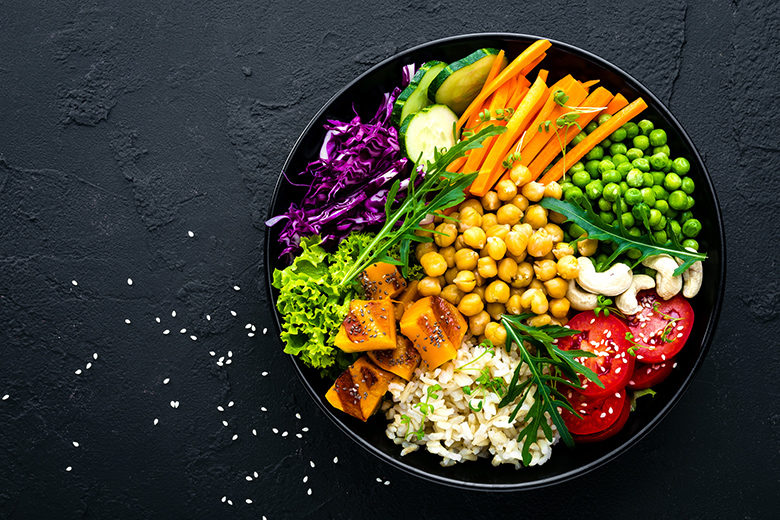
Going vegetarian or vegan is a choice that can directly impact your nutritional status. Though these groups who share similar dietary restrictions usually aim for optimal health, there are a few things to keep in mind before venturing down that path.
1. Calories
For most Americans, getting enough calories isn’t a problem. The initial switch to vegetarianism, however, can lead to cutting huge sources of calories and increasing the amount of fiber in the diet, leading to a fuller feeling. Avoid losing unhealthy weight and lean body mass by including plenty of nuts/seeds, whole grains, fruits (dried/fresh/frozen) and legumes!
2. Eat unprocessed
The best part about being vegetarian is that you increase your chances of consuming those wonderfully healthy plant-based foods, which have fiber, vitamins, minerals, antioxidants and phytonutrients (chemicals only found in plants). However, a lot of vegetarian products are frozen, packaged and processed. When foods are processed, some of these are lost — especially the fiber, antioxidants and potassium.
3. Iron
Vegetarians/vegans need about twice as much iron as meat eaters because of the different types of iron found in vegetable foods vs. meat. If you’re an athlete, you need even more! Focus on getting plenty of vegetables, beans and nuts to get your iron, and try to pair them with vitamin C-rich foods to enhance absorption (like you need an excuse to add mango salsa to that black bean salad).
4. Iodine
If you are avoiding dairy and choosing sea salt over iodized salt, iodine might be a concern for you. One of the best sources of iodine is sea vegetables — if you are not eating sushi with seaweed a couple times a week, you may want to consider it, or the occasional supplement. We only need a bit of iodine but it’s super important.
5. Vitamin B12
There’s so much talk about B12 on the internet. Despite what’s said, B12 will need to be supplemented even though gut bacteria produce a form of it. There are multiple forms of B12 that exist and only a couple have been shown to be usable by humans. Supplement B12 or eat B12 foods, such as fortified cereals, eggs, milk and cheese (depending on your specific diet).
6. Vitamin D
Vitamin D is an important nutrient that’s fortified in foods such as milk, but can mostly come from direct sunlight and supplementation. 600 IUs/day of vitamin D are recommended — this can be easily obtained through a multivitamin, drinking fortified dairy/non-dairy milks, cereals fortified with vitamin D or with a small vitamin D supplement. The vegan form of vitamin D appears to raise blood levels just as well as the non-vegan form, so if you have an issue with vitamin D3, make sure you’re getting a vitamin D2 supplement. Consult with your physician regarding you vitamin D status to be sure you are getting adequate amounts.
7. Omega 3 Fatty Acids
Only one of the three types of omega 3 fats is found in plants. Make sure you consume flax, chia and/or hemp regularly. If you’re concerned about not getting the animal form, algae contain this type as well — and algae oil supplements are available. If you have had heart problems, high cholesterol and/or diabetes and are a strict vegetarian, you want to pay closer attention to your consumption of this nutrient.
Making the switch to a vegetarian or vegan diet does not have to mean cutting out the nutrients you need. Whatever your reason for making the choice, YOUR health is of the utmost importance.







